Samsung Galaxy S8 vs LG G6: How do the Android heavyweights compare?
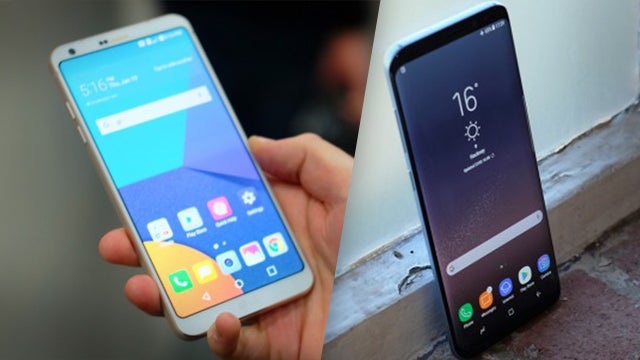
Samsung Galaxy S8 vs LG G6: All the specs compared
If you’re looking to pick up a new Android flagship this year, LG and Samsung have got you covered, with both manufactuers having now unveiled their latest flagships. Which smartphone is best? We compared the Galaxy S8 to the LG G6 and explain the key differences.
Back in February 2017, LG unveiled the LG G6 smartphone, its flagship handset for the early part of the year. We’ve been impressed by the phone so far, mainly because it’s a marked departure from the uninspiring LG G5 from 2016.
But Samsung is gunning for glory with the Galaxy S8, adopting a similar all-screen front and widescreen aspect ratio. We haven’t fully reviewed the Galaxy S8 just yet, but we’re pleased with what we’ve seen so far.
Here are all the key differences between the LG G6 and Samsung Galaxy S8.
In this article, I’ll be answering the following questions:
- How are the designs different?
- How do the LG G6 and Galaxy S8 specs compare?
- What’s new with the phone software?
- Which phone will be better value for money?
- Is the LG G6 the phone for you?
And if you’re just after a quick summary, scroll down to the bottom of the page.
Related: Best Android phones
LG G6 vs Galaxy S8 Design: What’s the difference?
Gone is the modular design of the LG G5. In its place, you’ll find new metal unibody design on the G6, which means the phone not only looks decidedly modern, but it’s also fully IP68 water-resistant. In other words, if you go dropping the G6 in the sink, you don’t need to worry.
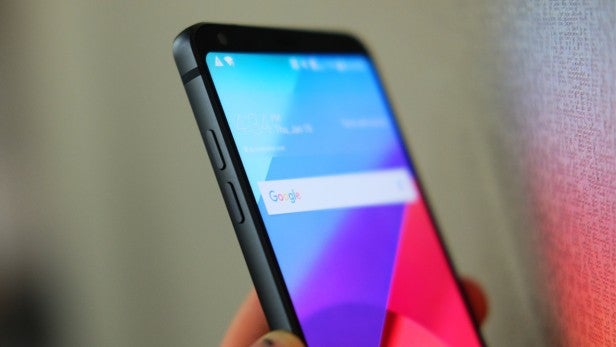 LG G6
LG G6
The new unibody design makes for a sleek, if a bit standard-looking device. There’s also no camera bump, which adds to the trim look, while a metal rim brings a sense of rigidity to the whole thing. The colour options are Black, White, or Platinum.
What has Samsung got up its sleeve to try to best its South Korean rival? Well, Samsung has ditched the home button, and has adopted an all-screen front – just like the LG G6. The fingerprint scanner now lives on the back of the phone instead.
But perhaps the biggest design trait the two phones look set to share is the the newly enlarged screen. LG has introduced a new 5.7-inch display, which it’s calling “Full Vision”. It essentially means the home button has been removed in order to enlarge the screen and reduce the bezel size, without the size of the phone increasing. Samsung has rolled out its own ‘Infinity Display’, which sees a 5.8-inch display crammed into a body that’s only marginally larger than its predecessor. We’ve also seen the curved, edge-to-edge ‘Edge’-style display rolled out on both the Galaxy S8 and Galaxy S8+.
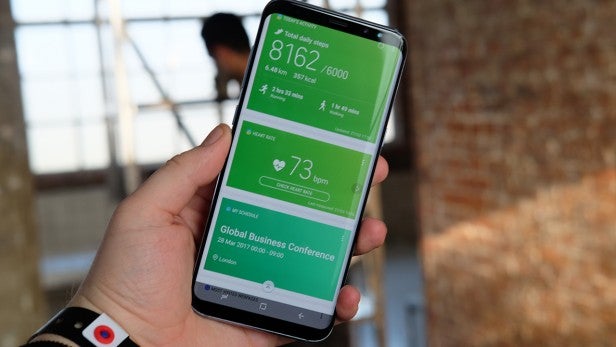 Samsung Galaxy S8
Samsung Galaxy S8
Apple’s infamous decision to remove the headphone jack on the iPhone 7 hasn’t been copied by LG here. The G6 comes complete with the 3.5mm port along with a USB-C port for charging. Samsung has followed suit, retaining the headphone jack, as well as introducing a USB Type C port – first seen on the Galaxy Note 7, but not the Galaxy S7.
Here’s our Mobile Editor Max Parker’s take on the new LG G6 design:
“The G6 is undoubtedly a lot nicer to look at than the G5. It is metal and glass for one, rather than a weird fake metal and plastic combo. But, it feels a bit same-y – it looks like any number of other phones from the sides and back. Screen aside, it lacks a really interesting design trait and that could harm it when the Samsung Galaxy S8 comes out.”
LG G6 vs Galaxy S8 Specs: Which phone is more powerful?
LG’s getting in on the 2017 smartphone action early and, as a result, has had to go without Qualcomm’s upcoming Snapdragon 835 processor. Instead, the less nippy – but still hugely powerful – Snapdragon 821 chip lies at the heart of the G6, along with 4GB of RAM.
Samsung, meanwhile, has kitted out the Galaxy S8 with either a Snapdragon 835 (Qualcomm) or Exynos 8995 (Samsung) chip. Both processors are built using a highly efficient 10nm manufacturing process, which means we should see significantly improved performance (or better efficiency) compared to the Snapdragon 821.
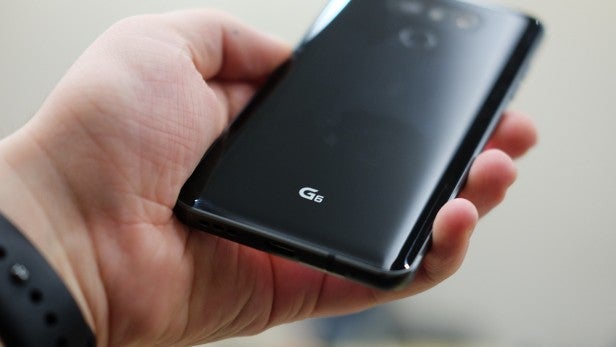 LG G6
LG G6
Turning to the screens, as mentioned, LG has already introduced its new 5.7-inch “Full Vision” display, and Samsung has done something similar. In LG’s case, the newly enlarged screen makes for an unorthodox 18:9 aspect ratio. and an odd resolution of 1440 x 2880. It means the screen is basically two squares stacked on top of each other, which will affect how the Android Nougat operating system looks, with LG making a few of its own tweaks to Google’s mobile OS.
Samsung’s display is even bigger at 5.8 inches, and has a more dense 1440 x 2960 pixel resolution – that’s 567ppi. The Galaxy S8 also features an OLED screen, which means pixels will emit their own light, resulting in deeper blacks and better energy efficiency than LCD displays. By contrast, LG is using LCD for the G6, although we’ve still been impressed by the visuals. We’ll have more once we’ve fully tested the two handsets.
Related: Best LG G6 deals
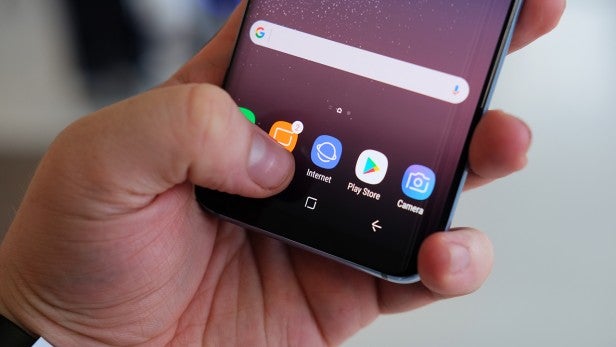 Samsung Galaxy S8
Samsung Galaxy S8
Storage for the S8 starts at a generous 64GB, which is a big leap from the 32GB Galaxy S7. Unfortunately, the LG G6 has a less impressive 32GB by default. In any case, both phones offer upgradeable storage courtesy of a Micro SD card slot.
Battery-wise, you’ll find a 3300mAh cell in the G6 with fast charging technology and a smaller one the Galaxy S8 at 3,000mAh. Still, with a more efficient chip on board, there’s every chance that the Galaxy S8 could still trump the G6 for battery life.
One thing that does look like it will separate these two phones is the camera. The dual camera setup on the G6 offers two 13-megapixel sensors, Optical Image Stabilisation (OIS) and an f/1.8 aperture. That means both lenses can be used as the main camera, and low-light performance promises to be impressive. Wide-angle shooting, seen by owners of last year’s G5, also seems to be a focus of the G6 this time around.
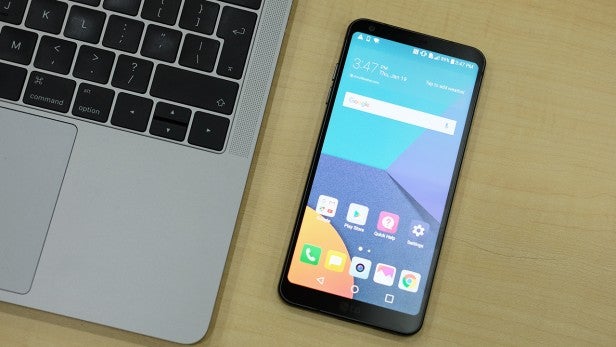 LG G6
LG G6
The Galaxy S8 has retained last year’s camera setup, offering blisteringly fast autofocus thanks to the company’s DualPixel technology. We should also expect sharper shots with less blurring as a result of the new multi-frame image processing. Unfortunately, we won’t be able to make any definitive comparisons until both phones have been fully reviewed.
One thing that may cause some controversy is that LG has neglected to include wireless charging for G6 models bought in the EU. Samsung, however, has offered wireless charging in all markets, including the UK. We’ve also been gifted an iris scanner, which is a carry-over from the ill-fated Galaxy Note 7.
Check out the specs for both phones below:
| Samsung Galaxy S8 | LG G6 | |
|---|---|---|
| Screen | 5.8 inches (Super AMOLED) | 5.8 inches (IPS LCD) |
| Display Resolution | 2960 x 1440 (567ppi) | 2880 x 1440 (564ppi) |
| Aspect Ratio | 18.5:9 | 18:9 |
| Primary Camera | 12 megapixels | f/1.7 | OIS | 13 megapixels | f/1.8 | OIS + 13 megapixels | f/2.4 |
| Secondary Camera | 8 megapixels | f/1.7 | AF | 5 megapixels | f/2.2 |
| Chipset | Snapdragon 835 (10nm) or Exynos 8995 (10nm) | Snapdragon 821 (14nm) |
| RAM | 4GB | 4GB |
| Storage | 64GB | 32GB |
| Battery Capacity | 3000mAh | 3300mAh |
| Waterproof? | Yes (IP68 certified) | Yes (IP68 certified) |
| Fingerprint Scanner? | Yes | Yes |
| Headphone Jack? | Yes | Yes |
| Primary Port | USB Type C | USB Type C |
| Iris Scanner? | Yes | No |
| Wireless Charging? | Yes | Yes (US only) |
| Micro SD Slot? | Yes | Yes |
| Dimensions | 148.9 x 68.1 x 8.0mm | 148.9 x 71.9 x 7.9mm |
| Weight | 155 grams | 163 grams |
| Software | Android 7.0 Nougat | Android 7.0 Nougat |
Related: Best Android apps
LG G6 vs Galaxy S8 Price: Which phone is better value for money?
We don’t have pricing details for the LG G6 yet. The G5 was £529 when it launched, and we’re expecting the G6 to be more expensive in the post-Brexit age. Perhaps closer to the £600 mark.
The Galaxy S8, meanwhile, costs a hefty £689, which is a fair whack more than the £569 launch price for the Galaxy S7. We still don’t know whether the LG G6 will match this pricing, but in any case, it’s going to be an expensive year to buy a new phone.
On paper, the Samsung Galaxy S8 looks like it’s got the better hardware, so those seeking bleeding edge specs may be willing to fork out top dollar. But the most sensible decision could be to pick up an older phone that’s already dropped in price, like the Galaxy S7.
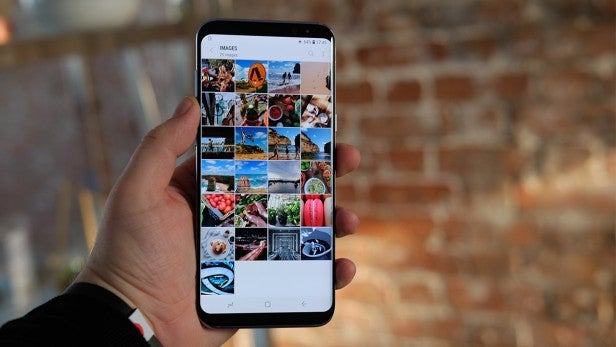 Samsung Galaxy S8
Samsung Galaxy S8
LG G6 vs Galaxy S8: Which one should you buy?
If you’re considering the LG G6, here’s our advice right now:
If you’re using an older Android device, it’s probably worth waiting for the S8. If you’re looking to upgrade an older phone, Samsung looks like it will have one of the best phones of 2017 if it can continue its success from last year. The S7 was outstanding, and things looks set to improve with the S8. The G6 looks like a solid phone with some great features, but we’re leaning towards the S8 as a winner for now.
If you’re on a budget then perhaps neither phone is for you. Both the G6 and S8 are flagship phones, which means they’ll be the most expensive options on the market. There’s plenty of budget and mid-range options available, though. Consider, for instance, a Motorola Moto G handset, or even the cheap-but-powerful OnePlus 3T.
If you want the latest and best hardware, the S8 is the way to go. If money is no object, the S8 will come with the latest processors, the Snapdragon 835 or Exynos 9, which should give it an advantage in terms of performance. It also adds an element of future-proofing to the handset. LG G6 owners meanwhile, will have to make do with the Snapdragon 821 – though, there’s no denying it’s a powerful chip. For those who need the latest, however, Samsung has the edge.
LG G6 vs Galaxy S8 Summary: What’s the difference?
Here’s a quick overview of the differences between the LG G6 and the Galaxy S8.
Design: LG’s done a great job of creating a sleek-looking device, and has clearly topped last year’s G5. It isn’t the most exciting-looking phone, however. What’s more, after last year’s classy and refined Galaxy S7, Samsung has debuted a seriously slick Galaxy S8 with an attractive all-front screen that boasts curved edges.
Specs: There’s no doubt both phones will be incredibly fast. LG using the Snapdragon 821 will ensure a slick user experience. But Samsung will likely have the edge thanks to the Snapdragon 835, a newer and more powerful chip. In short, we’re expecting the S8 to be faster, but you probably won’t notice too much of a difference – both phones will be sufficiently quick.
Price: The Galaxy S8 starts at £689, while LG has yet to confirm pricing.
Value: Samsung’s Galaxy S8 is seriously expensive at £689, and we’d expect the LG G6 to undercut it, if only by a little. Still, those seeking the best specs will probably look to Samsung, and will likely be willing to pay extra for such a luxury. However, we’ll need to wait for full reviews before making a final call here.
Related: Best smartphones
What do you think of the LG G6? Or the Galaxy S8, for that matter? Let us know in the comments.

